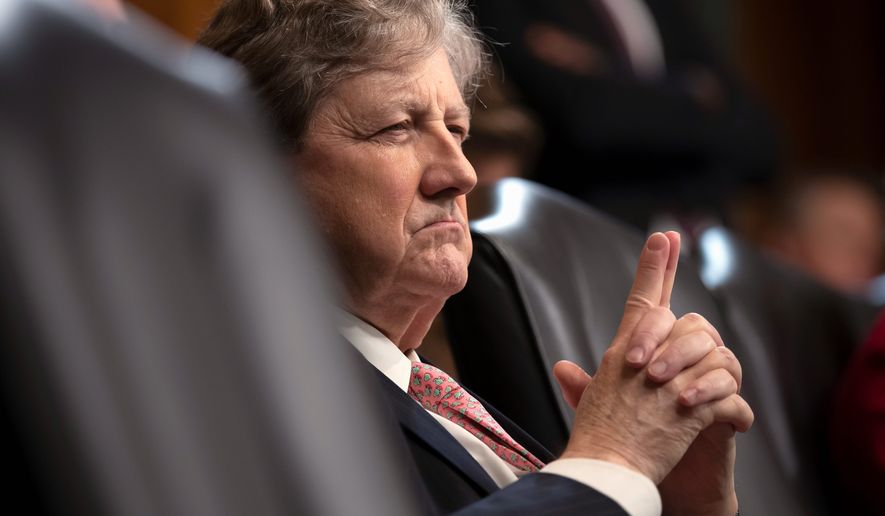Turns out the advice that grandparents would dispense with U.S. savings bonds every holiday is true: Save money, and it will add up.
The only problem is, folks aren’t cashing in.
The U.S. Treasury is sitting on an estimated $25 billion worth of matured U.S. savings bonds waiting to be redeemed, said Sen. John Kennedy, who says it’s time folks get what’s coming to them.
The Louisiana Republican said he is introducing legislation to prod the government to let folks know whether they have money waiting for them, which should make it easier for them to collect.
“Your grandmother didn’t want the money to sit in the Treasury when she bought that savings bond for you,” Mr. Kennedy said in a statement. “The federal government just would rather use that money than release the information needed to redeem the bonds.”
His solution is to allow states access to federal records, which he said would make it easier for people to search to determine whether they have unredeemed savings bonds.
The feds have sold more than $660 billion worth of savings bonds since 1935.
The matured pile of unredeemed bonds has grown. In March 2016, the National Conference of State Legislatures estimated there were $17 billion worth of such bonds. Mr. Kennedy’s office puts that figure now at $25 billion, a 47% jump in just three years.
Bonds can be cashed at a bank or online, beginning a year after they were bought. Cashing before five years, though, draws a penalty, and the bonds earn interest for up to 30 years.
A $50 EE bond issued in 1989, at a cost of $25, matures this year at more than $100 in worth.
But remembering that you had one, much less laying hands on it, can be a hurdle.
The Treasury Department didn’t respond to questions about Mr. Kennedy’s legislation, but on its website it acknowledged “records relating to accrual savings bonds are not fully automated, so a report listing the owners of matured, unredeemed accrual savings bonds is not available.”
The return of unclaimed property including bonds and checks was a favorite topic of Mr. Kennedy’s when he was Louisiana’s state treasurer. Though he has moved on to the U.S. Senate, his former office still boasts of its successes by featuring a sort of running counter that as of Friday proclaimed, “We have returned more than $519,566,567.”
Given the lack of an accessible database to help Americans redeem their bonds — a void Mr. Kennedy’s bill seeks to fill — states have been the biggest players in the niche unredeemed mature U.S. savings bond market.
These states are eyeing unclaimed mature bonds, arguing that they are better suited to connect bondholders with their money than the federal government, and they also hope to collect on bonds that may now be without an owner.
Kansas has been particularly aggressive. It sued the Treasury Department in 2013 to be paid for more than $151 million in bonds to which the state claims to be entitled under its unclaimed property law, a statute that lets Kansas take possession of all unredeemed bonds whose owner’s last known address was in the state.
The state says it would try to reunite bonds with their owners, but if nobody is found, then the state could claim the money as its own after three years.
A federal claims judge ruled in favor of Kansas in 2017, but the federal Treasury Department is resisting, saying it doesn’t believe Kansas has the right under federal regulations to take ownership of the bonds.
The department did dole out more than $866,000 as redemption on unclaimed or lost bonds that the state did have in its possession.
More than two dozen states now have some sort of law attempting to streamline the process for identifying — and in some cases claiming — ownership, with 18 of those laws passing in 2014 and 2015.
“It always used to be that you had to have the paper, the actual bond, but in recent years Kansas and other states have ruled they may count other forms of proof of the bond, that it exists,” said Heather Morton, a fiscal affairs specialist with the National Conference of State Legislatures.
The National Association of Unclaimed Property Administrators, an offshoot of the state treasurers’ association, strongly supports the bill.
“Passing the Unclaimed Savings Bond Act of 2019 will allow state treasurers and other state officials who administer unclaimed property programs to return more than $25 billion in unclaimed savings bonds to the rightful owners,” the organization said in a statement to The Washington Times.
Mr. Kennedy said that under his bill, once states have access to the federal records, they can list the bonds in their own state unclaimed property databases.
His legislation already has two backers, both fellow Republicans: Sens. Bill Cassidy of Louisiana and Jerry Moran of Kansas.
It’s not the first time Congress has pondered the issue.
Sen. John D. Rockefeller IV, West Virginia Democrat, introduced a bill a decade ago to have the Treasury Department conduct a pilot program to explore how it could contact bond owners, including providing money to states to help. That bill attracted 18 co-sponsors but never saw action.
• A previous version of this story incorrectly stated the position Kennedy held in Louisiana before he was elected to the U.S. Senate. He was the state treasurer.
• James Varney can be reached at jvarney@washingtontimes.com.




Please read our comment policy before commenting.